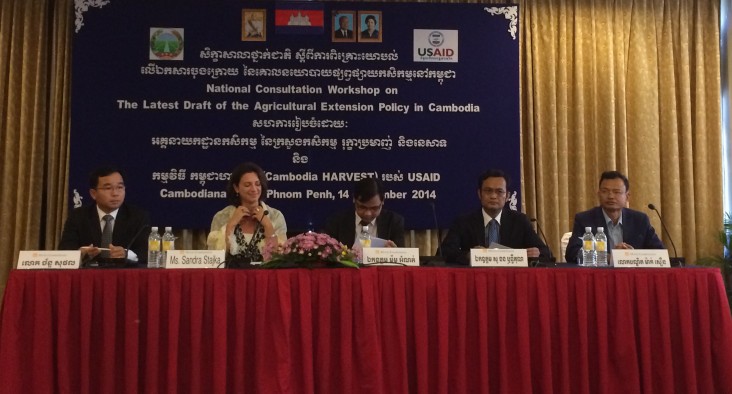
Your Excellency Dr. Mam Amnot, Secretary of State, Ministry of Agriculture, Forestry and Fisheries
Your Excellency So Khan Rithykun, Director General of General Directorate of Agriculture, Ministry of Agriculture, Forestry and Fisheries
Excellencies, distinguished guests, ladies and gentlemen
Good morning
It is my great pleasure to welcome all of you today to the National Consultation Workshop on “the Latest Draft of Agricultural Extension Policy.” U.S. Agency for International Development (USAID), through its Feed the Future Initiative, is pleased to be able to support the development of an Agriculture Extension Policy in cooperation with the Ministry of Agriculture, Forestry and Fisheries (MAFF).
The U.S. government, through President Obama’s global food security initiative known as “Feed the Future,” strives to increase agricultural production, incomes, nutrition, and the resiliency of rural households. I am very pleased to inform you all that Cambodia was one of nineteen countries in the world selected to participate in this initiative.
Agriculture remains a cornerstone of the Cambodian economy, accounting for 27.5 percent of the total Gross Domestic Product and with about 70 percent of the population relying on agriculture. Improving productivity, diversifying and commercialization of crops are the key priority areas of the National Strategic Development Plan (NSDP 2014-2018) and the Draft Agriculture Strategic Development Plan (ASDP 2014-2018), which USAID is focused on supporting.
Extension service plays an important role in increasing agricultural production. Extension provides farmers with technical knowledge and information related to improved agricultural practices. Most developing countries have established an agricultural extension service to promote the use of modern inputs to increase agricultural production, such as new seed varieties, fertilizer, and pesticides by training farmers, organizing method and result demonstrations, and making extensive use of the mass media.
However, like many countries around the world, Cambodia’s agricultural extension service is facing a number of challenges including uncoordinated extension services, inadequate funding for public extension service, lack of quality trained technicians, poor communication between farmers and extension providers, limited access to appropriate technologies for smallholder farmers, weak farmer to market and research linkages. The Ministry of Agriculture, Forestry and Fisheries should be praised for this effort to address such a list of challenges that in the end will benefit the vast majority of Cambodia’s farmers and rural population.
Excellencies, distinguished guests, ladies and gentlemen
MAFF’s General Directorate of Agriculture established a Core Team to coordinate and formulate the draft of the Policy, and the Minister appointed an Advisory Committee consisting of leaders of relevant institutions, helping to champion the policy development process. Over the last 10 months the team has conducted five regional consultation workshops throughout the country, and study visits to Vietnam and Thailand to learn about existing situations and challenges, gather priorities, and solicit solutions. The National Consultation Workshop organized in Phnom Penh in July this year received great feedback from relevant government agencies, development partners and the private sector.
Global and regional experiences suggest that extension services are demand-based and market-driven, incorporating private sector as well as government and non-governmental resources. Development of a good Agriculture Extension Policy requires inclusive and participatory processes, and I applaud the Ministry of Agriculture, Forestry and Fishers and other key stakeholders for their engagement in a robust participatory process over the past year.
I understand that the Core and Advisory Teams have been working very hard to address and incorporate those comments and suggestions. Still, your active participation today is crucially important to ensure that your input is incorporated, key challenges are addressed and priorities are captured through the Agriculture Extension Policy. I would also like to highlight that this could not have happened without the support of Dr. Murari Suvedi of Michigan State University, USAID’s HARVEST team, Australia’s Cambodia Agricultural Value Chain Program, and most importantly MAFF’s Core and Advisory teams.
The Feed the Future initiative is the United States’ commitment to address global hunger and food insecurity through improved collaboration and the application of knowledge. Today’s conference is an example of that commitment.
Finally, we look forward to your active participation and fruitful discussions.
Thank You!
Related Speeches
- Remarks by Polly Dunford, Mission Director, USAID Cambodia, Launch Event of Feed the Future Cambodia Harvest II
- Remarks by Christina Lau, Deputy Director, Office of Public Health and Education, USAID/Cambodia, Opening Ceremony of the Kick-Off Workshop for “One Health Workforce”
- Remarks by Veena Reddy, Deputy Mission Director, USAID Cambodia, EPIC Showcase







Comment
Make a general inquiry or suggest an improvement.